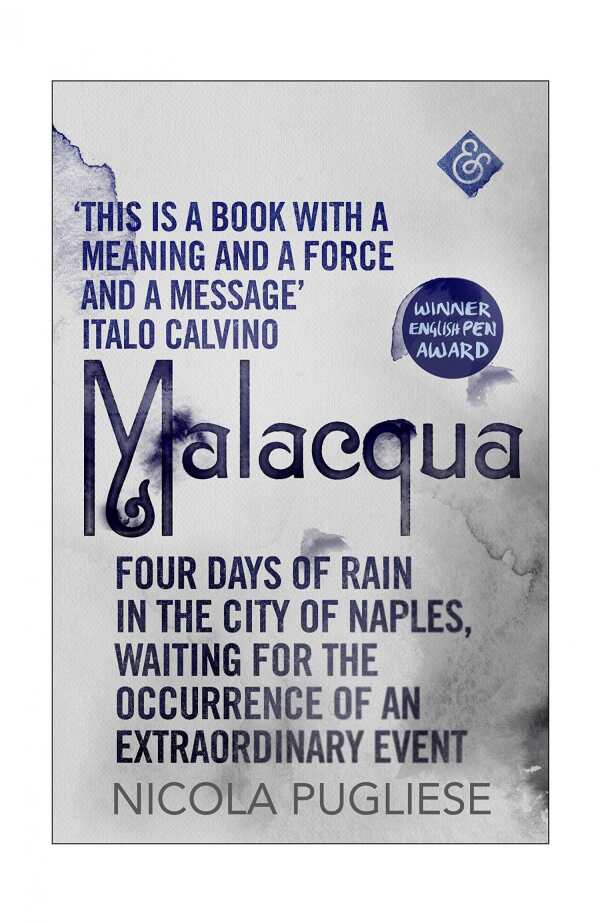Malacqua
Four Days of Rain in the City of Naples Waiting for the Occurence of an Extraordinary Event
Pugliese deftly turns the dark clouds of imagination into a life-affirming ode.
Nicola Pugliese’s unusual Malacqua was first published in 1977 by Italo Calvino. Never reprinted until after Pugliese’s death, it appears for the first time in English translation by Shaun Whiteside.
This meticulous literary experiment presents a tidal wave of catalogs, overheard intimacies, emergencies, monologues, and breathless moods over the course of a few days in October. Against the backdrop of torrential rain, a sharp sense for the boundary between public and private thought reveals all the urgency of a documentary.
The multistranded, expansive narrative features Carlo Andreoli—a newspaperman who loosely threads the work—as well as men and women who experience the rain’s progression from natural phenomena to nuisance, warning, mysterious force, and psychological intrusion.
One section, which features a doll that produces strange noises, embodies the unsettling quality of the storm. Accidents combine with eerie events that highlight the bureaucratic nature of a city coping with the unexpected. As serpentine paragraphs rake over mundane and philosophical details, councilors wrestle over whether or not the accidents were due to negligence. Despite the characters’ frustration, there’s little trace of cynicism.
Pugliese captures the resignation of a people who quickly adapt to circumstance. The work becomes as much a twentieth-century portrait of endurance as it is a challenge to conventional storytelling. Winding, ecstatic, with full knowledge that rain must eventually cease, the work barrels forward in a surprisingly moving consideration of ordinary experiences. Subtler side stories prove fascinating.
Loves, deaths, the hopes of parents, illicit affairs, pivotal memories, grief, and everyday concerns gather with increasing pressure, then rapidly fade. Characters enter and leave with minimal fanfare. Their intense, internal wanderings mark their crossing.
The result is a city of voices existing in suspended drama. Carlo Andreoli’s lengthy interlude, which splices the act of shaving with reflection, exemplifies the book’s extreme approach to time, which stretches thin, appears to pause, then resumes. When the end finally arrives, Pugliese deftly turns the dark clouds of imagination into a life-affirming ode.
Reviewed by
Karen Rigby
Disclosure: This article is not an endorsement, but a review. The publisher of this book provided free copies of the book to have their book reviewed by a professional reviewer. No fee was paid by the publisher for this review. Foreword Reviews only recommends books that we love. Foreword Magazine, Inc. is disclosing this in accordance with the Federal Trade Commission’s 16 CFR, Part 255.

